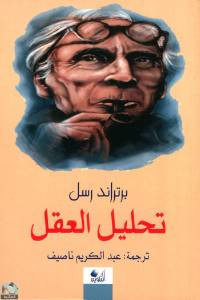📘 ❞ The Impact of Science on Society (Routledge Classics) by Bertrand Russell ❝ كتاب ــ برتراند راسل اصدار 1889
الفكر والفلسفة - 📖 كتاب ❞ The Impact of Science on Society (Routledge Classics) by Bertrand Russell ❝ ــ برتراند راسل 📖
█ _ برتراند راسل 1889 حصريا كتاب ❞ The Impact of Science on Society (Routledge Classics) by Bertrand Russell ❝ عن جميع الحقوق محفوظة للمؤلف 2025 Russell: SEVEN LECTURES DEALING WITH VARIOUS ASPECTS OF MODERN SCIENTIFIC INFLUENCE Bertrand Arthur William (1872 1970) was an influential British philosopher, logician, mathematician, and political activist In 1950, he awarded the Nobel Prize in Literature, recognition his many books The “Prefatory Note” to this 1952 book states, “This is based lectures originally given at Ruskin College, Oxford, England Three these Chapter I, ‘Science Tradition,’ II, ‘General Effects Scientific Techniques,’ VI, Values’ were subsequently repeated Columbia University, New York, published University Press… last chapter … ‘Can a be Stable?’ Lloyd Roberts Lecture Royal Medicine, London ” In first lecture, observes, “It hardly till time Lister Pasteur that medicine can said have become scientific diminution human suffering owing advances beyond all calculation Out work great men seventeenth century new outlook world developed, it outlook, not specific arguments, which brought about decay belief portents, witchcraft, demoniacal possession, so forth ” (Pg 6) He continues, “The modern universe very different sort place Since victory Copernican system we known earth center For sun replaced it, but then turned out no means monarch among stars, fact, scarcely even middle class… Milky Way one collection galaxies, 30 million are It easy maintain one’s cosmic importance view such overwhelming statistics 13 14) In second suggests, “Communications been hitherto chief factor limiting size empires… This difficulty diminished railways telegraph, point disappearing with improvement long range bomber There would now technical single wide Empire war likely more destructive life than has recent centuries, unification under government probably necessary unless acquiesce either return barbarism or extinction race 26) He “America invented phrase ‘yes men’ for those who flatter executives troubled ‘no men,’ make their business employ clever ignorance opposing sabotaging every scheme suggested knowledge imagination enterprise I am afraid our thousand times harmful American ’ If recover prosperity, shall find ways emancipating energy from frustrating control constitutionally timid ignoramuses 37) الفكر والفلسفة مجاناً PDF اونلاين ترتيب أمور معلومة للتأدي إلى مجهول ويُستخدم الدراسات المتعلقة بالعقل البشري ويشير قدرة العقل تصحيح الاستنتاجات بشأن ما هو حقيقي أو واقعي وبشأن كيفية حل المشكلات ويمكن تقسيم النقاش المتعلق بالفكر مجالين واسعي النطاق وفي هذين المجالين استمر استخدام المصطلحين "الفكر" و"الذكاء" كمصطلحين مرتبطين ببعضهما البعض الفلسفة (لغويا من اليونانية φιλοσοφία philosophia والتي تعني حرفيًا "حب الحكمة") هي دراسة الأسئلة العامة والأساسية الوجود والمعرفة والقيم والعقل والاستدلال واللغة غالبًا تطرح مثل هذه كمسائل لدراستها حلها ربما صاغ مصطلح "فيلسوف (محب الحكمة)" الفيلسوف وعالم الرياضيات فيثاغورس (570 495 قبل الميلاد) تشمل الأساليب الفلسفية الاستجواب والمناقشة النقدية والحجة المنطقية والعرض المنهجي وهذا ركن خاص بكتب مجانيه للتحميل

كتاب
The Impact of Science on Society (Routledge Classics) by Bertrand Russell
ــ برتراند راسل
صدر 1889م
كتاب
The Impact of Science on Society (Routledge Classics) by Bertrand Russell
ــ برتراند راسل
صدر 1889م- مساهمة من: محمد عبيد
( الأحد 5 يناير 2025 ( 6:23 مساءً )) - تبليغ عن سوء استخدام

SEVEN LECTURES DEALING WITH VARIOUS ASPECTS OF MODERN SCIENTIFIC INFLUENCE
Bertrand Arthur William Russell (1872-1970) was an influential British philosopher, logician, mathematician, and political activist. In 1950, he was awarded the Nobel Prize in Literature, in recognition of his many books.
The “Prefatory Note” to this 1952 book states, “This book is based on lectures originally given at Ruskin College, Oxford, England. Three of these---Chapter I, ‘Science and Tradition,’ Chapter II, ‘General Effects of Scientific Techniques,’ and Chapter VI, ‘Science and Values’---were subsequently repeated at Columbia University, New York, and published by the Columbia University Press… The last chapter … ‘Can a Scientific Society be Stable?’ was the Lloyd Roberts Lecture given at the Royal Society of Medicine, London.”
In the first lecture, he observes, “It is hardly till the time of Lister and Pasteur that medicine can be said to have become scientific. The diminution of human suffering owing to the advances of medicine is beyond all calculation. Out of the work of the great men of the seventeenth century a new outlook on the world was developed, and it was this outlook, not specific arguments, which brought about the decay of the belief in portents, witchcraft, demoniacal possession, and so forth.” (Pg. 6)
He continues, “The modern universe is a very different sort of place. Since the victory of the Copernican system we have known that the earth is not the center of the universe. For a time the sun replaced it, but then it turned out that the sun is by no means a monarch among the stars, in fact, is scarcely even middle class… the Milky Way … is one of a collection of galaxies, of which about 30 million are known. It is not easy to maintain a belief in one’s cosmic importance in view of such overwhelming statistics.” (Pg. 13-14)
In the second lecture, he suggests, “Communications have been hitherto the chief factor limiting the size of empires… This difficulty was diminished by railways and the telegraph, and is on the point of disappearing with the improvement of the long-range bomber. There would now be no technical difficulty about a single world-wide Empire. Since war is likely to become more destructive of human life than it has been in recent centuries, unification under a single government is probably necessary unless we are to acquiesce to either a return to barbarism or the extinction of the human race.” (Pg. 26)
He states, “America has invented the phrase ‘yes-men’ for those who flatter great executives. In England we are more troubled by ‘no-men,’ who make it their business to employ clever ignorance in opposing and sabotaging every scheme suggested by those who have knowledge and imagination and enterprise. I am afraid our ‘no-men’ are a thousand times more harmful than the American ‘yes-men.’ If we are to recover prosperity, we shall have to find ways of emancipating energy and enterprise from the frustrating control of constitutionally timid ignoramuses.” (Pg. 37)
#8K
0 مشاهدة هذا اليوم#31K
1 مشاهدة هذا الشهر#130K
60 إجمالي المشاهدات- 🎁 كن أول كاتب اقتباس في هذه الصفحة واحصل على هديّة 15 من النقاط فوراً 🎁
-
كتب أخرى لـ برتراند راسل:
- ❞ إنهم يجعلون علم النفس يعتمد بشكل متزايد على علم الهيئة والمشاهدة الخارجية، ويميلون للتفكير بالمادة كشيء ما أكثر تماسكاً بكثير وأقل عرضة للشك من العقل، بينما الفيزيائيون، ولا سيما أينشتاين والأنصار الآخرون لنظرية النسبية، يجعلون ((المادة)) أقل وأقل مادية. عالمهم يتكون من وقائع تستمد منها المادة من خلال تركيب منطقي. فكل من يقرأ، مثلاً، كتاب الأستاذ إدينغتون ((المكان، الزمان والجاذبية)) سيرى أن المادة عتيقة – الطراز لم تعد تلقى دعماً من الفيزياء الحديثة. وأظن أن ما يتصف بقيمة ثابتة في نظر السلوكيين إنما هو الشعور بأن الفيزياء هي العلم الأكثر أساسية في الوجود الراهن. لكن هذا الموقف لا يمكن أن يدعى مادياً، إذ لم تعتبر الفيزياء، كما يبدو أنها هي الحالة، وجود المادة أمراً مفروغاً منه.. ❝ ⏤برتراند راسل❞ إنهم يجعلون علم النفس يعتمد بشكل متزايد على علم الهيئة والمشاهدة الخارجية، ويميلون للتفكير بالمادة كشيء ما أكثر تماسكاً بكثير وأقل عرضة للشك من العقل، بينما الفيزيائيون، ولا سيما أينشتاين والأنصار الآخرون لنظرية النسبية، يجعلون ((المادة)) أقل وأقل مادية. عالمهم يتكون من وقائع تستمد منها المادة من خلال تركيب منطقي. فكل من يقرأ، مثلاً، كتاب الأستاذ إدينغتون ((المكان، الزمان والجاذبية)) سيرى أن المادة عتيقة – الطراز لم تعد تلقى دعماً من الفيزياء الحديثة. وأظن أن ما يتصف بقيمة ثابتة في نظر السلوكيين إنما هو الشعور بأن الفيزياء هي العلم الأكثر أساسية في الوجود الراهن. لكن هذا الموقف لا يمكن أن يدعى مادياً، إذ لم تعتبر الفيزياء، كما يبدو أنها هي الحالة، وجود المادة أمراً مفروغاً منه. ❝
⏤ برتراند راسل




